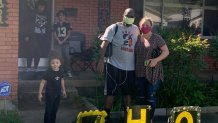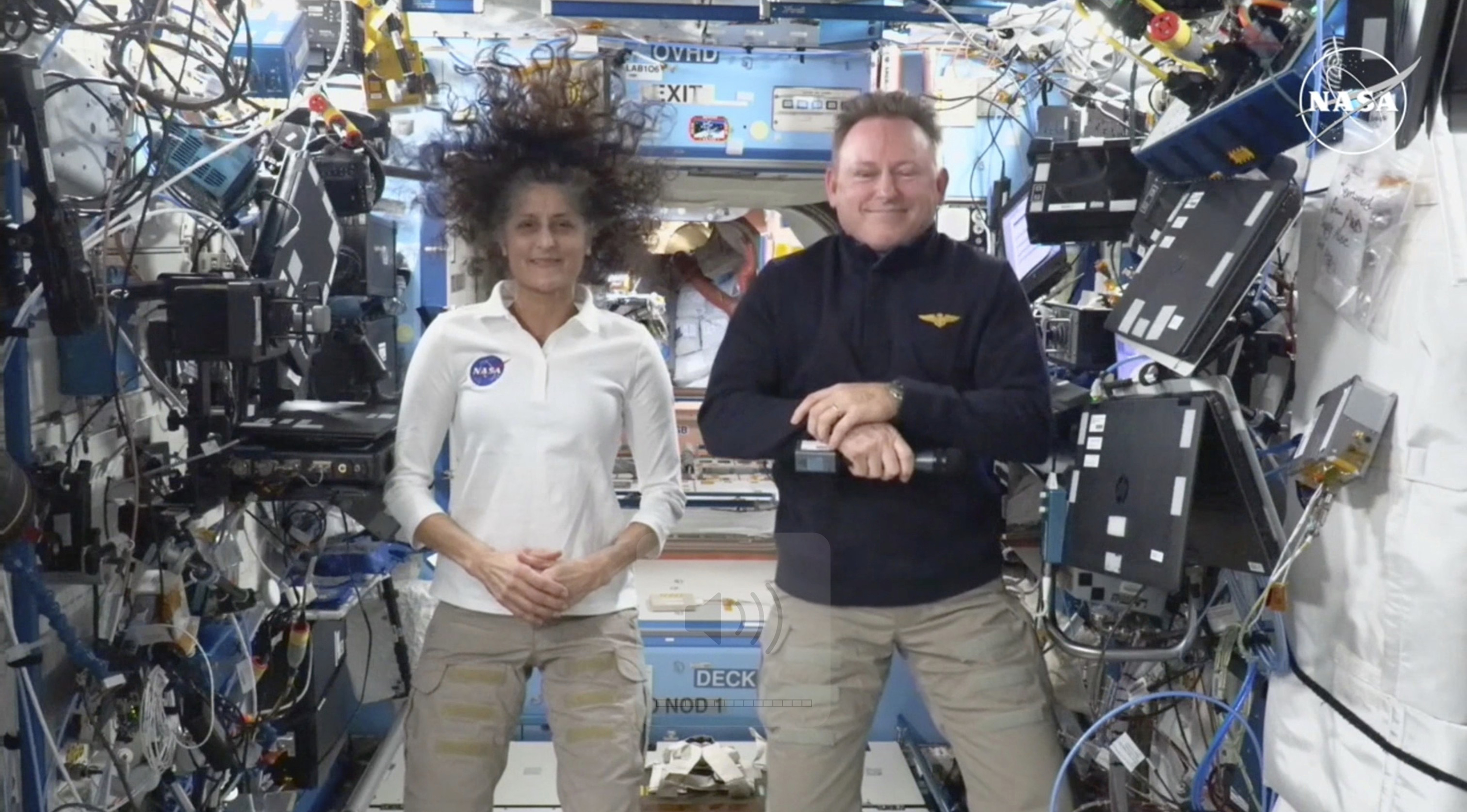Thirty American and Envoy Airlines ramp workers at Dallas-Fort Worth International Airport have been infected with the 2019 novel coronavirus, at least one has died, and 26 other Envoy employees with symptoms were awaiting test results Wednesday, according to the union that represents them, raising concerns on why they’ve been hit so hard by the pandemic.
There is no way to know how or where they were exposed to the coronavirus.
Two workers, including one ramp worker who nearly died from the virus, told NBC 5 Investigates they feel American Airlines and its regional carrier, Envoy, did not do enough to protect them and their ground crews.
Fresh off a ventilator and still hooked to a breathing tube in his hospital room, C.J. Thomas said in an emotional interview that he just wants to go home to his wife and young children.
“Hug my kids and my wife … cause I haven’t seen them in like, forever,” Thomas said, his wife watching on a video monitor as she wiped away tears.
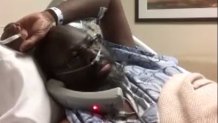
In an interview with NBC 5 Investigates, the union representing ramp workers at Envoy and American voiced concerns that the government has not given timely guidance on how airports and airlines should protect against the pandemic. That, they said, may have contributed to the early wave of infections that hit the DFW ground crews who pull luggage from the bellies of passenger planes, wipe down their cabins and clean their bathrooms.
U.S. & World
News from around the country and around the globe
“The problem is the guidance, I would argue, has been weak for the airline industry,” said Gary Peterson, international vice president of the Transport Workers Union.
“Would we have liked to have seen things happen a lot faster, or for things to be happening faster? Absolutely,” Peterson said.
NBC 5 Investigates obtained from the union the numbers for those sickened, infected and/or possibly infected -- numbers that Fort Worth-based American Airlines, through a spokeswoman, said it would not comment on.
The airline did say in a statement that, “the safety of our customers and team members remains our top priority” and that it had “expanded our cleaning procedures …”
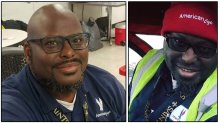
A 19-year veteran of Envoy, Thomas has diabetes, but said he otherwise almost never gets sick.
Then COVID-19 showed up.
“I just had to drop him off at the ER, and I wasn’t allowed to go in and he was alone,” said his wife, Halle, fighting back tears.
C.J. spent 10 days on a ventilator, his family not knowing whether he would live or die.
Then, recovering, he spoke exclusively to NBC 5 Investigates.
Before getting sick, Thomas, 43, said he worried that the virus could spread among the ramp crews who work side-by-side, cleaning airplane cabins and handling bags – possibly some from travelers coming from COVID-19 hot spots throughout the world.
He thought then, with little to do since air travel had nearly come to a halt and as social distancing became new buzz words, whether they should crowd into break rooms at Terminal B.
“It’s like, nowhere to go. Like, all these break rooms are like, super packed,” Thomas said.
Union officials have told NBC 5 Investigates that more than two dozen Envoy and American Airlines ramp workers at DFW Airport have been infected and at least one has died, with others waiting for their test results to come back after feeling symptoms.
They are numbers surpassed only by those in New York, where about 60 American ramp workers are sick; they pale in comparison to Chicago and Los Angeles, where the union said five or fewer workers have been infected.
American Airlines declined to comment on the number of sick ramp workers at any of the airports where they operate.
Union and airline officials are also awaiting final word on whether COVID-19 caused the death of another worker, Glenmar Gabriel, who cleaned airplane cabins for Envoy at DFW Airport.
Gabriel’s family told NBC 5 Investigates they learned a day after his death that he had tested positive for COVID-19 after Gabriel's doctor provided them with test results, but a final ruling on what caused his death was pending as of late Wednesday.
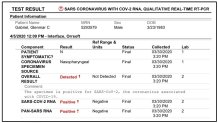
Thomas said it was only after he awoke from his sickness that he learned so many of his co-workers had also fallen ill and that his friend Gabriel had died.
“I just couldn’t, I just couldn’t believe it. It was shocking to me,” he said.
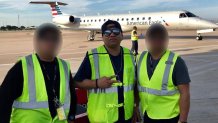
Another Envoy worker, Kelly Kolberg, told NBC 5 Investigates that after he learned of Gabriel’s death, he decided to post on social media photos he took on March 21, of the filled break rooms.
“Things are super serious now. These aren’t just positive infections. We’ve got a loss of life now,” Kolberg said.
He said he hoped in posting the pictures that it would shine a light on what he described as cramped conditions workers faced.
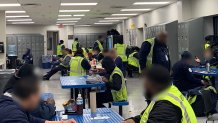
But American, Kolberg said, responded by saying he had violated company policy by showing the pictures, and placed him on suspension.
He said he does not regret what he did.
“I’ll sleep. I’ll sleep well at night cause it’ll be for doing the right thing,” Kolberg said.
Both Kolberg and Thomas said they believe more could have been done to protect them and their co-workers.
An American Airlines spokesperson declined to comment on Kolberg’s job status. But it provided the photos below to show managers had recently removed some furniture from break rooms, and opened new break areas, allowing workers a better way to keep physically distance themselves from one another.
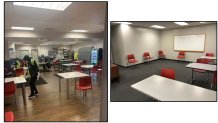
Union VP Peterson told NBC 5 Investigates he believes American Airlines has tried to follow the government’s safety guidelines. But he thinks federal officials should have directed airlines to separate workers and issue masks sooner. He also said American could have been more proactive in protecting ramp workers who are exposed to travelers, their luggage and airplane cabins.
“Every person that goes to work for an airline is at risk, and they should be protected the same way,” Peterson said, adding: “And the guidance should be, in my view, minimum respirator, minimum gloves.”
On April 4, American Airlines announced it would provide masks to all front-line employees after the Centers for Disease Control and Prevention issued new recommendations.
In a statement to NBC 5 Investigates, American said: "The safety of our customers and team members remains our top priority ... In response to our employees' concerns about COVID-19, we have expanded our cleaning procedures ... and have introduced procedures to ensure employees maintain proper distance from others and follow all CDC recommendations for personal hygiene."
On March 22, one day after Kolberg, the concerned Envoy worker, took pictures of the break rooms, American sent a memo to its workers at DFW that said they “must maintain a minimum of six feet of distance from each other” to comply with social distancing rules ordered by Tarrant County on March 21.
But by that time, C.J. Thomas said, he was just beginning to feel sick.
Hooked up to monitors but hoping to go home soon, Thomas reflected on all that has happened since the outbreak began.
“We are the ones that, you know, make that company go around,” Thomas said. “And, you know, I think they should have protected us more.”
NBC 5 Investigates learned Wednesday night Thomas got his wish and was sent home that afternoon from Medical City Las Colinas where the medical staff cheered for him as he was wheeled out of the building where just days ago he was fighting for his life.
